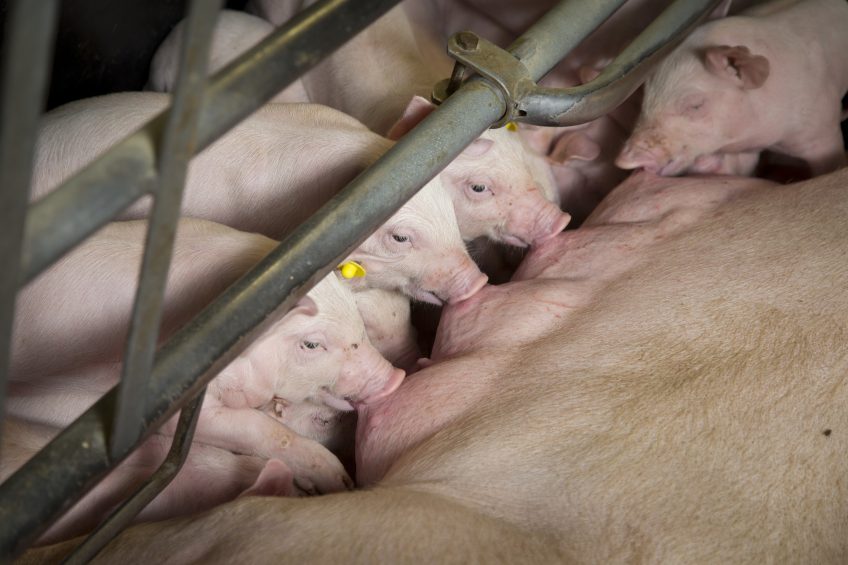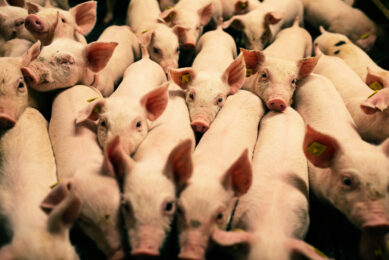Piglets benefit from alpha-monoglyceride in the sows’ diet

A good start in life is of great importance for every animal, but the success depends on many factors.
One of the most effective ways to influence health of newborns is through genetics. Influencing genetics is a long-term process, especially in pig husbandry. Increasing litter size and weight, however, brings forth a negative side effect as young sows cannot consume as much energy as is required by the suckling piglets. This results in a negative energy balance of the sow, mainly in second parity.
One way to counter this effect and boost the start of young piglets is through sow nutrition. As the performance of suckling piglets is primarily influenced by the quality of sow milk, nutrition of the sow is of utmost importance to fulfill the piglets’ nutritional needs. Framelco has developed an approach to improve piglet health and performance by including its systemically available alpha-monoglycerides in lactation diets.
Alpha-monoglycerides under practical circumstances
Trial 1
In this article 2 trials are discussed which show the effect on sow and piglet performance when alpha-monoglycerides are administrated via the sows’ diet. The first trial was performed at a commercial pig farm with research facilities. The farm housed 700 productive sows, which work in a weekly rhythm. In the trial 40 sows were used, divided over 2 treatment groups of 20 sows each.
The control group did not receive any antimicrobial additive through the feed, whereas the treatment group received 2 kg of FRA Gut Balance Dry (alpha-monocaprylin, alpha-monocaprin, alpha-monobutyrin & alpha-monopropionin) per ton of feed from 7 days before farrowing until the moment of weaning (after 25-28 days of lactation). Both groups received the same basal diet and were fed twice a day according to the feed curve. Adding FRA Gut Balance Dry to the sows’ diet resulted in weaned piglets with a significant higher weaning weight and average daily weight gain (Table 1).
Trial 2
The second trial was conducted in the Philippines (Table 2). Eighteen crossbred female pigs (average parity: 3.39±0.32) were randomly assigned to 2 dietary treatments. The first group was the control group and received a basal diet. The second group received the basal diet supplemented with FRA C12 Dry (alpha-monolaurin) at 2 kg/ton from day 101 of gestation and continued until weaning when piglets were 30 days old. Piglets from sows that received alpha-monolaurin showed lower pre-weaning mortality (10.32 vs 14.44%). Adjusted 30-day weaning weight (6.34 vs 5.41 kg; P=0.08) and adjusted 30-day litter weight at weaning (61.88 vs 53.50 kg) were also improved.
Likewise, alpha-monolaurin supplementation in sows shortened weaning to breeding interval (5.56 vs 10.67 days; P=0.09). Both studies showed the potential of supplementing alpha-monoglycerides on lactation diets in increasing growth and survivability of piglets. But how does it work?
Anti-microbial properties
Medium chain fatty acids (MCFA) are widely used as feed additives in pig production. Since the late 1970s researchers started to investigate the alpha-monoglycerides of these MCFA, like alpha-monocaprylin, alpha-monocaprin and alpha-monolaurin. An alpha-monoglyceride is formed by the esterification of an acid to the first position of glycerol. During initial studies scientists discovered that these alpha-monoglycerides have a stronger antimicrobial effect compared to the free fatty acid, resulting in a lower minimum inhibition concentration.
In the decades that followed the mode of action was further unravelled. Alpha-monoglycerides of MCFA are fat-like molecules and possesses both lipophilic (fat-loving) and hydrophilic (water-loving) characteristics. The same characteristics can be found in the cytoplasmic membrane of Gram-positive bacteria. As a result, alpha-monoglycerides of MCFA can interfere with the membrane, resulting in disintegration and increased permeability of the membrane and eventually in cell death of these pathogens.
In another study it was shown that alpha-monolaurin inhibited the production of the harmful exoprotein staphylococcal toxic shock toxin-1(TSST-1), produced by Staphylococcus, which acts on the vascular system by causing inflammation, fever and shock. This protein is produced after signals are transferred via the membrane to the nucleus of the bacterium. So, it is hypothesised that alpha-monolaurin can disturb or block the trans-membrane signal transduction which is needed to pass signals via the membrane and lead to harmful protein production.
Looking back at the discussed trials, this means that the sows in the treatment groups could have less problems with pathogens and therefore have more vital piglets. However, not only sows may benefit from the alpha-monoglycerides. The fattier a compound is, the more likely it is to be transported via the lymphatic system after absorption. From fat-like compounds, like alpha-monolaurin, it is known to be present in breast milk. It is suggested that part of the medium chain alpha-monoglycerides are directly fed to the suckling piglets via their mother’s milk.
Anti-inflammatory properties
More recently, new insights on medium chain alpha-monoglycerides were discovered which can explain the obtained results. It was demonstrated that alpha-monolaurin has anti-inflammatory properties. This is of great interest for the pig industry as inflammation can reduce growth. Inflammation is defined as a reaction of tissue to any harmful stimulus. This stimulus can either be of physical, chemical or immunological origin, but can also be caused by microorganisms like bacteria, parasites, and viruses.
It is known that even mild immune challenges already induce a reduction in feed intake and consequently can have a negative impact on growth. This is because immune cells require nutrients and energy to perform their function. Anti-inflammatory compounds can help to overcome this problem. Indeed, alpha-monolaurin used in FRA C12 Dry has shown in an in vitro model carried out by KU Leuven to have anti-inflammatory properties. In literature, hamsters infected with Giardia lamblia had lower levels of the pro-inflammatory cytokines Interferon-gamma (IFN-γ). Another article showed an in vitro test where alpha-monolaurin had antimicrobial activity against Candida albicans and down-regulates the expression of host pro-inflammatory cytokines IL-1α and IL-1β.
It is important to remember that the immune system should be activated in case of high pathogenic pressure, but we should avoid that the immune system over-reacts when small challenges occur. If we can manage to reduce the negative impact of pro-inflammatory processes by supplying anti-inflammatory compounds like alpha-monoglycerides, we are one step closer to achieving 100% of the genetic growth potential of swine.
References available on request











